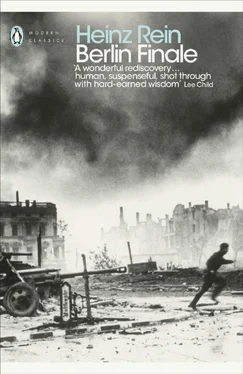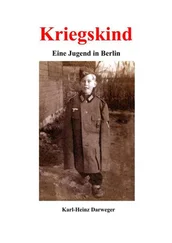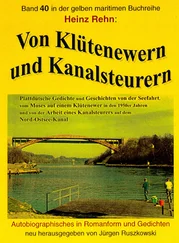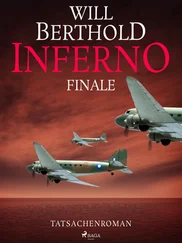Wellenhöfer nods. ‘Adamek was exactly that kind of guy,’ he says, ‘I made him clean out the latrines with his hands, he had to scour the SS men’s quarters with a handkerchief-sized cleaning cloth until it shone, but I couldn’t get that look of superiority out of his face. That chap’s face irritated me so much that in the end I tied him to the vaulting horse with my own bare hands and gave him twenty-five great, loud blows, but the swine didn’t even shout. Then he fainted, and when a cold shower had put him back on his feet he looked at me as if to say: you can destroy my body, but not my mind. I would have beaten him to death next time, I’m sure of it, but I was transferred to Buchenwald, which was just being set up at the time. Damn it all, I remember the fellow, it’s just his name… But we’ll have that very shortly, the list is on its way.’
There is a knock at the door, an SS man comes in, salutes, hands over a list and disappears.
Wellenhöfer opens the list and begins to read. It’s very quiet in the room, the only sounds Wellenhöfer’s quick breathing and the rustle of paper. Siering sits there excitedly and watches Wellenhöfer’s finger wandering from line to line. Then the silence is suddenly broken. Wellenhöfer throws the list on the table, jumps to his feet and claps his Untersturmführer heartily on the shoulder.
‘You’ve landed a big one, Siering,’ he says. ‘What do we care about the little saboteur at Karlshorst, this Franz Adamek has been a wanted man since 1941, he was also supposed to have been involved in the twentieth of July.’
‘So who is he really?’ Siering asks excitedly.
‘The bastard’s name is Friedrich Wiegand!’, Wellenhöfer replies triumphantly.
15 April, 10.00 a.m.
The Berlin Stadtbahn is an eleven-kilometre viaduct supported by countless arches; it runs through the heart of the city from east to west in a four-lane thoroughfare. The houses and factories huddle up to it, their rough, soot-blackened firewalls are a huge balustrade with gaps built in at Jannowitz Bridge, Alexanderplatz, the Stock Exchange, Friedrichstrasse Station, the Zoological Garden and Savignyplatz, through which the business of the city crashes in a great wave against the viaduct. Only between the stations of Tiergarten and Bellevue, crossing the Charlottenburger Chaussee known as the east-west axis, the fleeting glance takes in more significant details, the Tiergarten, the Brandenburg Gate, the Victory Column, Charlottenburg Bridge, before the dark chasm of the firewalls closes over it again.
Lassehn has boarded the S-Bahn at Silesian Station for Charlottenburg.
He is paralysed with shock as he looks at the disfigured face of the city and sees smoke-blackened walls, blind window sockets, twisted iron joists, charred wood, mountains of rubble, dangling power lines, gaping streets.
The Stadtbahn is a ghost train, Berlin has become an inhabited Pompeii, a city which has already rotted away in many places, and in others is suppurating from freshly opened wounds.
The two angular, bulky high-rise blocks close to the entrance of Alexanderplatz Station have remained strangely unchanged, their white towers, once showy and gleaming with glass and concrete and snow-white plaster, now have a merely shabby elegance made of cardboard, wood and dirty grey concrete. Just past the exit of the station a stretch of almost complete destruction begins, in fact extending all the way to Charlottenburg. Lassehn looks into grey, dark chasms, closed off by fallen walls, and the car parks of long rows of wrecked cars, formerly brightly lit streets with balconies on which geraniums blossomed, with neon signs and cars gliding over smooth, mirrored asphalt. But behind Lehrter Station there begins the hideous wasteland of the former Hansa district. It was destroyed completely in one night, going up in a single, huge conflagration beneath an overcast, rainy sky.
Lassehn is stunned.
In those thirty minutes that the journey takes from Silesian Station to Charlottenburg, he becomes aware for the first time that this city is his home, and he has not previously seen it as anything remarkable, he has taken its gifts for granted, as if things could not be otherwise. Now he understands that much is irrevocably lost, and since the end of the war is not in sight, still more will fall into rubble and ashes.
One question burns in him, and he cannot find the answer. What is it that enables people to tolerate and endure such an existence, which they euphemistically call life? Is it really a belief in a big idea, divine providence, that enables them to do so? Or is it only the iron compulsion that ruthlessly crushes those who do not comply? Or merely the small chance of saving one’s own small self from the general chaos?
Lassehn studies the faces of his fellow passengers. They are slack, weary faces which reflect only hopelessness and resignation, but there are also hard, grim faces, with wrinkles and harsh edges that allow no easy smile. He remembers an article that he read recently in the newspaper, which he picked up by chance, he looks in the faces once more and takes the newspaper from his coat pocket, his eyes slide over the lines. Yes, there it is:
We have become a people on the defensive. We work, we work and fight, wander and trek, suffer and endure, and we do so with mute dignity. No weakness may befall us, not for a second may we waver. We must remain firmly on our feet, even if we bleed from a thousand tears and scratches and the body of our people is riven with countless wounds. Later they will be our scars of honour. Then the nation will bear for all time the face of the warrior.
The man who wrote that is not some hack, not some propaganda unit reporter, giving vent to his inner warrior poet, no, the article is by no less a figure than Dr Joseph Goebbels and published on 11 February 1945 in the Reich under the headline ‘A People on the Defensive’.
Lassehn keeps looking attentively at the faces, but he sees nothing there of mute dignity, of the honour of being able to endure the wounds of war and bear its scars, the pride of belonging to a nation of warriors and not one of well-fed, peaceful civilians. He can read nothing in those faces but despair and stubborn defiance, a reluctant flinching from fate, whose shadow is already falling upon them, a wrangling with destiny that refuses to accept defeat. Admittedly they had not at first agreed with the war, they did what they saw as their duty, but their enthusiasm had not been fired. The army columns did not march singing as they did in 1914, accompanied by music and decked with flowers, through the streets to the railway stations, the women and girls did not cheer them as they had back then, and no flags fluttered in the windows. It was still a war that began with an invasion and at first found little resonance on the ground. After the victory over Poland, however, people began to come to terms with the fact of war, and what the authorities had not succeeded in doing, could not have succeeded in doing at the beginning of the war (because everything had been done secretly and in a clandestine fashion, and because even with the most elegant distortion of the facts it could not be turned into a war of self-defence), namely the creation of consensus and a certain amount of enthusiasm, did occur when Denmark, Norway, Holland, Belgium, France, Yugoslavia and Greece fell, military and political success seemed to prove the leaders of the Reich right, and also the rich bounty flowed in from the conquered nations (after the seductive bubble of the pre-war years had left no doubt about the rightness of the National Socialist management of the economy), then people came to agree entirely with the war, it was their cause, they suddenly believed in themselves, and it also seemed wise for them to stick with the winning side.
Читать дальше












